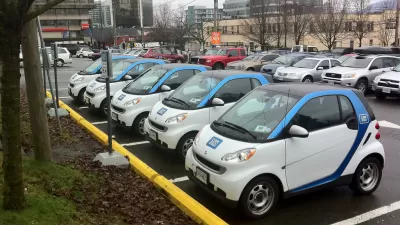Stephanie Steinberg and Bill Vlasic survey the growing universe of car-sharing services. From big corporations to non-profits, the high demand for car sharing in urban areas allows a variety of alternatives to "coexist comfortably."
With about two dozen car-sharing services currently operating in the United States, the growing rental universe is far from homogenous. From Smart cars fleets that charge customers by the minute and allow for one-way rentals and free street parking to industry stalwarts that offer numerous rental locations and a wide variety of automobiles, "rental providers are trying to differentiate themselves" to attract a share of the 800,000 people who belonged to car-sharing services in the United States last year, report Steinberg and Vlasic.
What explains the rise in car-sharing, and its many variants?
“There’s a trend in general for people wanting to pay for what they use,” said Car2go’s chief executive, Nicholas Cole. “It’s like the success in iTunes, where people choose to buy a few songs instead of the whole album.”
"The need for cheap, convenient mobility is fueling the growth of car sharing around the world, said Susan Shaheen, co-director of the Transportation Sustainability Research Center at the University of California, Berkeley. She said that recent statistics showed 1.7 million car-sharing members in 27 countries, not including so-called peer-to-peer services that allow drivers to rent vehicles directly from individual car owners."
"A menu of mobility options works for some consumers, like Michelle Fox, a 27-year-old executive of a technology company in Washington. Ms. Fox recently sold her Toyota S.U.V. because of the cost of car payments, insurance and parking."
"Instead, she uses a combination of Car2go, a bicycle-sharing network and the Uber call-a-limo service."
FULL STORY: Car-Sharing Services Grow, and Expand Options

Planetizen Federal Action Tracker
A weekly monitor of how Trump’s orders and actions are impacting planners and planning in America.

Maui's Vacation Rental Debate Turns Ugly
Verbal attacks, misinformation campaigns and fistfights plague a high-stakes debate to convert thousands of vacation rentals into long-term housing.

Restaurant Patios Were a Pandemic Win — Why Were They so Hard to Keep?
Social distancing requirements and changes in travel patterns prompted cities to pilot new uses for street and sidewalk space. Then it got complicated.

Charlottesville Temporarily Has No Zoning Code
A judge ordered the Virginia city to throw out its newly revised zoning code, leaving permitting for new development in legal limbo.

In California Battle of Housing vs. Environment, Housing Just Won
A new state law significantly limits the power of CEQA, an environmental review law that served as a powerful tool for blocking new development.

Boulder Eliminates Parking Minimums Citywide
Officials estimate the cost of building a single underground parking space at up to $100,000.
Urban Design for Planners 1: Software Tools
This six-course series explores essential urban design concepts using open source software and equips planners with the tools they need to participate fully in the urban design process.
Planning for Universal Design
Learn the tools for implementing Universal Design in planning regulations.
Heyer Gruel & Associates PA
JM Goldson LLC
Custer County Colorado
City of Camden Redevelopment Agency
City of Astoria
Transportation Research & Education Center (TREC) at Portland State University
Jefferson Parish Government
Camden Redevelopment Agency
City of Claremont



























